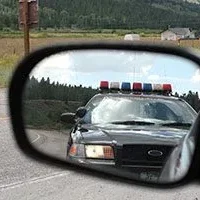What Are My Rights When I’m Pulled Over?

Almost everyone is bound to be pulled over by the police at least once in their lives. Even the most law-abiding drivers may unknowingly have a tail light out or, just by pure coincidence, drive the same vehicle as a reported criminal. Many individuals are unaware or misinformed of their rights. Here are some of the basic rights you do and do not have as a Florida driver who has been pulled over.
You Have the Right to Stop Safely
You may first wonder, “Do I have to pull over immediately?” When the police officer pulls up behind you and hits their lights and sirens, you must slow down promptly so they’re aware that you heed their call to pull over. However, once you’ve done this, you are allowed to continuing driving to find a safe space to pull over.
You should find the nearest, most practically safe place to pull over, as leading the cop on for many miles for this purpose might not go over well. If you’re driving down a regular road, this can mean waiting until you can pull into a parking lot or, if you’re on the highway, finding a safe place on the shoulder. Because pulling over to a safe place helps ensure the officer’s safety, they are likely to be understanding.
You Have the Right to Remain Silent
Being pulled over is more or less the same as all police encounters regarding your right to remain silent. The only information that you are required to provide is your license, registration, and insurance information. Past this basic information, which you can supply without speaking, you have the right to remain completely silent. That being said, however, staying completely silent may make the situation unnecessarily tense. As such, it’s generally advisable to be polite and courteous while also taking care not to say anything incriminating and politely refusing to answer any questions that you feel may lead to incriminating answers.
You DO NOT Have the Right to Stay in Your Car
Despite what you may have heard, you do not have the right to stay in your car if the police order you out. This applies even if you are a passenger in the vehicle. The Supreme Court of the United States has decided in two cases that both drivers and passengers may be ordered out of their vehicles in the course of an ordinary traffic stop. The Court’s rationale is that the need for officer safety outweighs the limited burden and intrusion caused by making the driver and passengers step out. As such, if an officer orders you out of the vehicle, be sure to comply calmly.
You Have a Right to Refuse Searches (But May Be Searched Anyway)
Generally speaking, a police officer must ask for your consent before searching your car. There are, however, several exceptions. First and foremost, if the officer has probable cause for a search, then he or she may search without consent.
For example, if the officer approaches the vehicle and smells a strong odor of drugs, they may have probable cause to search the vehicle. Second, anything in the officer’s plain view can be used as probable cause to justify a further search. If the officer walks up and sees a joint in your cup holder or ashtray, he or she may have probable cause to search the rest of your car. Third, as long as the officer doesn’t unnecessarily extend the traffic stop duration for a search, the police can walk a drug-sniffing dog around your car without your consent. If they ask to search your car with a drug-sniffing dog, though, you are free to refuse, but they may do so anyway. If the dog alerts to the presence of drugs, then the police will have probable cause to search the rest of your car. But never consent to the search if you have anything to hide.
Stay Calm, Be Polite
It’s been said many times that you can’t talk your way out of a ticket, but you can certainly talk your way into one. Being polite and staying calm can help defuse the interaction between you and the police. If you suspect that the police are violating your civil rights, such as searching your car without consent, don’t get hostile because this will not help you. Simply take note of what they are doing, so if you are charged with a crime, you can raise the defense that your civil rights were violated and possibly get the evidence being used against you suppressed.
Meldon Law Is Here to Help
You may still have questions about Florida’s pullover laws. If you need more information, have been charged with a crime, or feel that the police have violated your civil rights during a traffic stop, be sure to contact our experienced Meldon Law attorneys so we can get started on your case. Contact us today at 800-373-8000.

